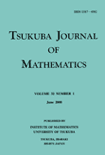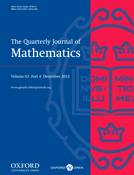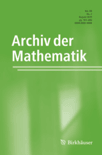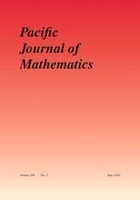
Periodica Mathematica Hungarica
Scope & Guideline
Pioneering Insights in the World of Mathematics.
Introduction
Aims and Scopes
- Algebra and Number Theory:
The journal frequently publishes papers addressing fundamental problems in algebra and number theory, including topics like Diophantine equations, prime number theory, and algebraic structures. - Geometry and Topology:
Research in geometry, particularly differential geometry and topology, is a core focus, with papers exploring manifolds, curvature, and geometric properties of spaces. - Functional Analysis and Operator Theory:
Contributions in functional analysis, including studies on operators, function spaces, and related inequalities are common, highlighting the journal's commitment to foundational mathematical analysis. - Combinatorics and Graph Theory:
The journal includes research on combinatorial structures and graph theory, investigating properties of graphs, hypergraphs, and combinatorial designs. - Dynamical Systems and Control Theory:
Papers discussing dynamical systems, stability, and control mechanisms reveal the journal's interest in applied mathematics and its relevance to real-world systems. - Mathematical Modeling and Analysis:
The journal encourages submissions that focus on mathematical modeling of complex systems, including those in physics, biology, and economics, showcasing the interdisciplinary nature of modern mathematics.
Trending and Emerging
- Higher-Dimensional Algebra and Category Theory:
Recent papers explore advanced topics in higher-dimensional algebra and category theory, indicating a growing interest in the abstract foundations of mathematics. - Nonlinear Dynamics and Chaos Theory:
Research examining nonlinear systems and chaos theory has gained traction, highlighting the intersection of mathematics with physics and engineering applications. - Mathematical Aspects of Machine Learning:
There is an increasing trend towards the application of mathematical principles in machine learning, suggesting a blend of theoretical and computational mathematics. - Fractional Differential Equations:
An emerging focus on fractional calculus and differential equations showcases the journal's adaptation to contemporary mathematical challenges and applications. - Algebraic Geometry and Its Applications:
Research in algebraic geometry, particularly its applications to number theory and theoretical physics, is on the rise, reflecting its relevance in modern mathematical discourse.
Declining or Waning
- Elementary Number Theory:
Papers specifically focused on classical elementary number theory have become less prevalent, possibly due to a shift towards more abstract algebraic approaches. - Basic Combinatorial Techniques:
Basic combinatorial methods, while still relevant, appear to be waning as researchers delve into more complex combinatorial structures and their applications. - Classical Geometry:
The focus on traditional geometric studies has diminished, with fewer contributions addressing classical problems in Euclidean or projective geometry. - Basic Probability and Statistics:
Submissions dealing with elementary probability theory and statistics are less frequent, as the field increasingly gravitates towards more sophisticated probabilistic models and statistical methodologies.
Similar Journals

Research in the Mathematical Sciences
Elevating the Standards of Mathematical ScholarshipResearch in the Mathematical Sciences is a prestigious journal published by Springer International Publishing AG, specializing in a diverse range of mathematical disciplines. With an ISSN of 2522-0144 and an E-ISSN of 2197-9847, this journal operates out of Switzerland and has established a reputation for excellence in research dissemination since its inception in 2014. The journal is currently ranked in the highly regarded Q2 quartile for Applied Mathematics, Computational Mathematics, and Mathematics (miscellaneous), along with a Q3 rank in Theoretical Computer Science, reflecting its substantial influence within the academic community. Researchers will find great value in this journal as it features high-quality, peer-reviewed articles that contribute to the advancement of mathematical sciences. The journal promotes open access options, facilitating greater accessibility to innovative research findings. With its comprehensive scope and strong Scopus rankings, Research in the Mathematical Sciences serves as an essential resource for academics, professionals, and students eager to stay at the forefront of mathematical research and its applications.

Bulletin Mathematique de la Societe des Sciences Mathematiques de Roumanie
Empowering Researchers with Rigorous Mathematical InsightsThe Bulletin Mathematique de la Societe des Sciences Mathematiques de Roumanie, published by SOC MATEMATICE ROMANIA, is a distinguished platform dedicated to the dissemination of advanced mathematical research and developments. With ISSN 1220-3874 and E-ISSN 2065-0264, this journal serves the global mathematical community, particularly in Romania, fostering collaboration and innovation in varied mathematical disciplines. Despite being categorized in the Q3 quartile of the *Mathematics (miscellaneous)* field and holding a Scopus rank placing it in the 19th percentile, the journal remains committed to publishing high-quality articles that explore theoretical and applied mathematics. Running from 2008 to 2024, it aims to encourage the sharing of knowledge and advancements within both academic and practical domains, affirming its importance as a valuable resource for researchers, professionals, and students alike. Although the journal does not currently offer open access, it contributes to the mathematical discourse through the rigorous selection of papers that adhere to high scholarly standards.

Tsukuba Journal of Mathematics
Elevating the Discourse in Mathematics for Global ImpactTsukuba Journal of Mathematics is a distinguished publication dedicated to advancing the field of mathematics through the dissemination of innovative research and comprehensive studies. Published by the University of Tsukuba, Department of Mathematics, this journal serves as a vital platform for mathematicians, researchers, and students to engage with cutting-edge mathematical theories and methodologies. Although currently not available as an open-access journal, it maintains a strong academic presence, contributing significantly to the global mathematical landscape. The journal invites submissions across various branches of mathematics, aiming to foster scholarly communication and collaboration. The ISSN 0387-4982 and the E-ISSN 2423-821X further establish its credibility and accessibility among the academic community, supporting its critical objective of facilitating high-quality research output. Situated in Tsukuba, Japan, a hub for scientific research and development, the Tsukuba Journal of Mathematics is committed to bridging gaps in mathematical knowledge and encouraging exploration of novel ideas.

CZECHOSLOVAK MATHEMATICAL JOURNAL
Charting New Territories in MathematicsCzechoslovak Mathematical Journal is a distinguished academic journal published by Springer Heidelberg, dedicated to advancing the field of mathematics through the dissemination of high-quality research. With an ISSN of 0011-4642 and E-ISSN 1572-9141, this journal has been a pivotal platform for mathematicians and researchers from around the globe since its inception. The journal holds a Q3 ranking in the field of Mathematics (miscellaneous), demonstrating its commitment to providing a forum for the latest mathematical theories and applications, particularly in general mathematics, as indicated by its Scopus rank of #285/399 and 28th percentile in the field. While currently not offering open access options, the journal continues to attract a wide readership by making its valuable content available through traditional subscription models. The Czechoslovak Mathematical Journal serves as an essential resource for researchers, professionals, and students aiming to stay informed about recent developments and breakthroughs in mathematics, with focus years converging from 1995 to 2024.

ANNALES DE L INSTITUT FOURIER
Pioneering Research in Algebra and GeometryANNALES DE L INSTITUT FOURIER is a premier academic journal published by ANNALES INST FOURIER, specializing in the fields of Algebra and Number Theory as well as Geometry and Topology. Since its establishment, the journal has garnered a distinguished reputation, evidenced by its Q1 quartile ranking in the 2023 category assessments and its Scopus Rank of #37 out of 119 in Algebra and Number Theory, and #34 out of 106 in Geometry and Topology, placing it within the top percentile of its field. The journal serves as a vital platform for disseminating groundbreaking research and innovative methodologies, catering to a global audience of researchers, professionals, and students. With a commitment to the advancement of mathematical sciences, ANNALES DE L INSTITUT FOURIER invites contributions that push the boundaries of knowledge and foster collaboration across disciplines. Although it does not offer open access, the rigorous peer-review process ensures that published papers meet the highest academic standards, making it a critical resource for anyone engaged in advanced mathematical research.

PUBLICATIONES MATHEMATICAE DEBRECEN
Unveiling New Perspectives in MathematicsPublicationes Mathematicae Debrecen is a renowned international journal published by the University of Debrecen, Institute of Mathematics, situated in Hungary. This journal, with both ISSN 0033-3883 and E-ISSN 2064-2849, has established itself in the field of mathematics since its inception, with coverage extending from 1997 to 2024. Recognized for its rigorous academic standards, it currently holds a Q3 ranking in the mathematics (miscellaneous) category for 2023 and ranks at the 42nd percentile among general mathematics journals in Scopus. Publicationes Mathematicae Debrecen aims to disseminate high-quality research across various areas of mathematics, contributing to the advancement of knowledge and practice in this dynamic field. Although it is not an open-access journal, its readers can access a wealth of scholarly work that addresses both theoretical and applied mathematical issues, making it an invaluable resource for researchers, professionals, and students alike.

QUARTERLY JOURNAL OF MATHEMATICS
Advancing Mathematical Frontiers with Every IssueQuarterly Journal of Mathematics, published by Oxford University Press, stands as a pivotal resource for the mathematical community, focusing on a broad spectrum of topics in the field of mathematics. With its esteemed history dating back to 1930, this journal continues to foster innovative research and discussions, providing a platform for scholars to share their findings and insights. Although the journal currently holds a Q3 classification in mathematics (miscellaneous) and is ranked #207 among general mathematics publications in the Scopus database, its commitment to quality and rigorous peer review ensures that it remains relevant and insightful. Researchers, professionals, and students alike will find the Quarterly Journal of Mathematics an invaluable tool for advancing knowledge and understanding in various mathematical disciplines, making it an essential addition to any academic library.

ARCHIV DER MATHEMATIK
Exploring the Depths of Mathematical InnovationARCHIV DER MATHEMATIK is a distinguished journal published by SPRINGER BASEL AG, renowned for its contributions to the field of mathematics. Established in 1948 and continuing its legacy through to 2024, the journal provides a platform for innovative research and scholarly articles that push the boundaries of mathematical theory and application. With an ISSN of 0003-889X and an E-ISSN of 1420-8938, it holds a reputable position within the academic community, reflected by its Q2 ranking in the 2023 Mathematics (Miscellaneous) category. Despite not being an open access publication, ARCHIV DER MATHEMATIK remains accessible to a global audience through various databases, ensuring the dissemination of high-quality research. The journal’s commitment to enhancing mathematical discourse makes it an essential resource for researchers, professionals, and students seeking to expand their understanding of this vital discipline.

INDIAN JOURNAL OF PURE & APPLIED MATHEMATICS
Advancing Mathematical Frontiers Since 1996INDIAN JOURNAL OF PURE & APPLIED MATHEMATICS, published by the INDIAN NATIONAL SCIENCE ACADEMY, stands as a vital resource in the realm of pure and applied mathematics since its inception in 1996. With ISSN 0019-5588 and E-ISSN 0975-7465, this journal aims to disseminate original research that advances the understanding and application of mathematical principles. Operating out of New Delhi, India, it serves a diverse readership comprising researchers, scholars, and practitioners in the mathematical sciences. Recognized within the Q3 category in both Applied Mathematics and Miscellaneous Mathematics as per the 2023 category quartiles, the journal emphasizes rigorous peer-reviewed articles that contribute to its impact in academia, reflected in its Scopus rankings. Although it does not currently operate as an open-access journal, it maintains a commitment to quality and accessibility of scholarly content, striving to foster academic collaboration and innovation. The convergence of full-text issues from 1996 to 2024 highlights its ongoing dedication to the evolution of mathematical research.

PACIFIC JOURNAL OF MATHEMATICS
Unveiling Innovative Research in the Realm of MathematicsThe PACIFIC JOURNAL OF MATHEMATICS, established in 1951 and published by Mathematical Sciences Publishers, is a premier peer-reviewed journal in the field of mathematics, renowned for its rigorous scholarship and impactful research contributions. With an HIndex that reflects its sustained academic influence, this journal has been categorized within the Q1 quartile in the field of mathematics (miscellaneous) as of 2023, showcasing its position among the top-tier mathematics journals globally. Although the journal operates under a traditional subscription model rather than an Open Access format, it remains dedicated to disseminating original research that spans various domains within mathematics. Researchers, professionals, and students alike will find the journal's breadth of topics and commitment to quality work instrumental in advancing their understanding and exploration of mathematical concepts. This esteemed journal continues to thrive as a vital resource for the mathematical community through its comprehensive collection of articles from a diverse range of mathematical disciplines, thus maintaining a significant role in shaping the future of mathematical inquiry.